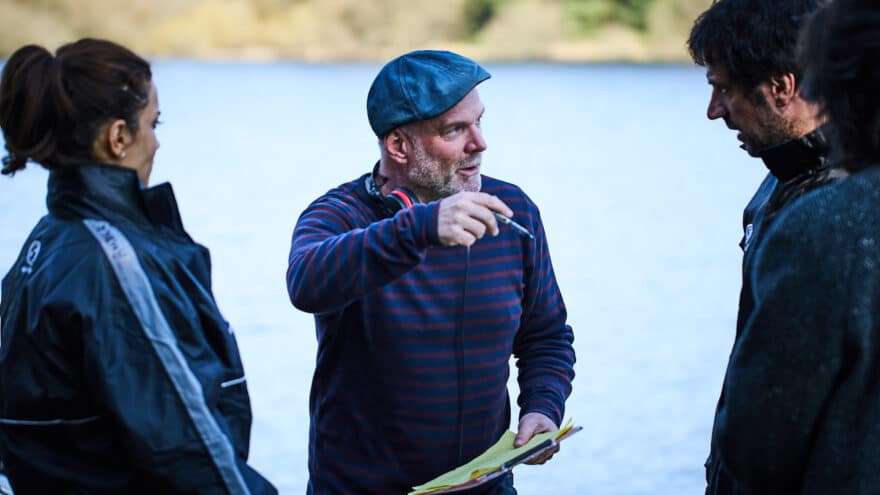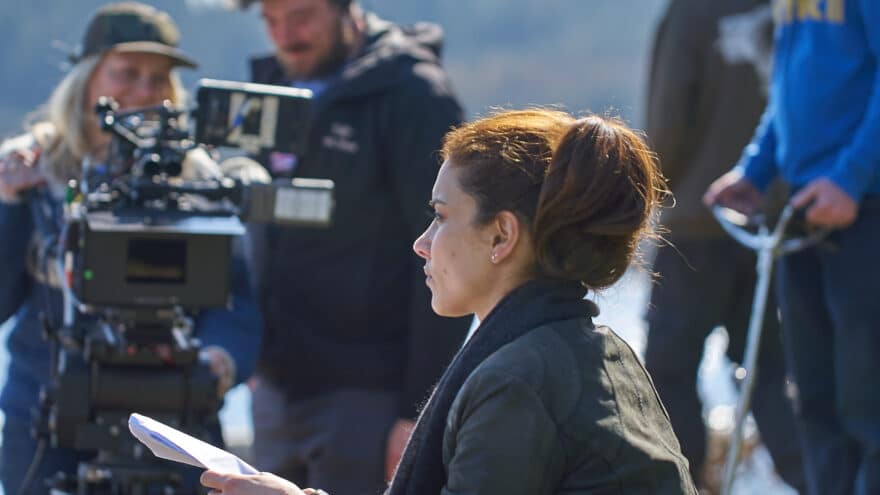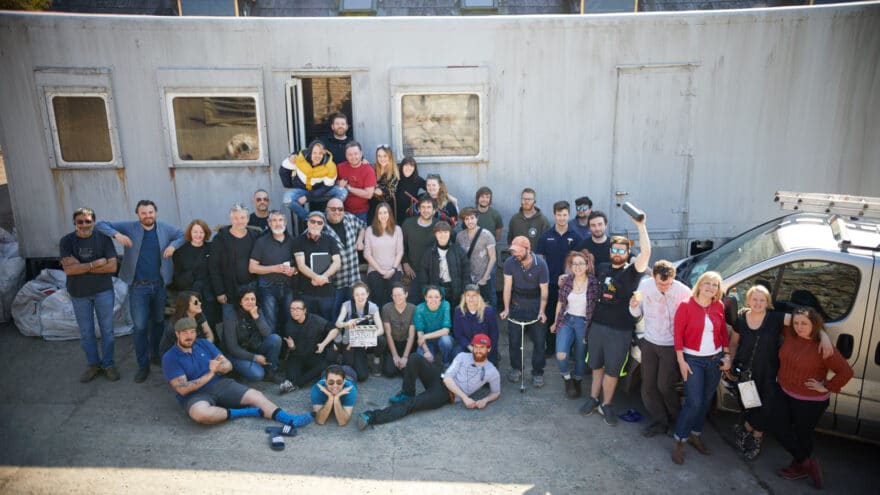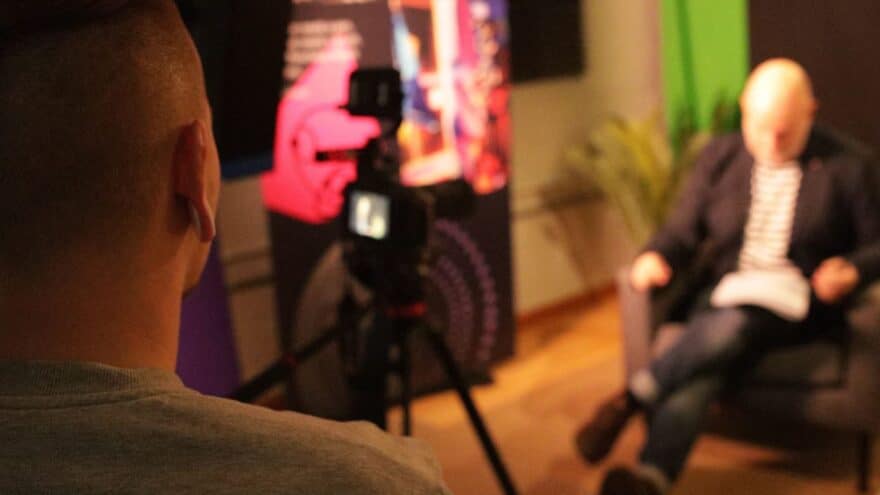‘Concrete Plans’ to premiere at FrightFest
Concrete Plans is a feature-length thriller written and directed by Screen and Film School Brighton Lecturer, Will Jewell.
With it’s World Premiere scheduled for the 23rd October via FrightFest, we thought we’d grab a few minutes with Will whilst one of our graduates Curtis Godfrey was filming his festival introduction video, to discuss the making of the film, working with Screen and Film School graduates, and how the festival landscape has changed due to the pandemic.
A huge congratulations on Concrete Plans premiering at Frightfest this week! How did the film originally come about?
Well, the film has been over 6 years in the making. I met my producer Rob Alexander through the Brighton film scene as he was a successful documentary producer (The Man Who’s Mind Exploded, Numan: An Android in La La Land). We were sharing an office in the Laines crammed with indie film makers and got chatting… I gave him a 5 page outline for this idea. I’d actually written it years earlier as a short which was essentially the pivotal portacabin scene midway which I expanded out. We were looking for something that could be shot cheap- i.e. handful of characters, limited number of locations- and it fit the bill. Film Wales helped us with development finance and liked the way it was taking shape. We got the script in a good place and I’d cast a few great actors who were attached and then Film Wales put in some production funding and we stitched the rest together through pre-sales, private finance and tax breaks. We shot in March 2019 and the film was completed earlier this year. Obviously the festival and market landscape has been decimated by Covid this year, so FrightFest will be the World premiere! It was meant to have two Leicester Square screenings, but its another Covid casualty as they’ve moved online.
Can you tell us a bit about the story? (spoiler-free of course!)

How did you approach the process?
Well, pre-production was fairly elongated as we had to push the dates back several times as we hadn’t secured all the budget. But the actors stuck with the project as they loved the script which was great. We didn’t know we’d definitely be going ahead until about 3 months before so that period was pretty frantic and is a bit of a blur. We ended up having 1 day rehearsal and 15 days to shoot which was as insane as it sounds. Particularly given its an ensemble with stunts etc. Post was the calm after the storm. It was great to have the headspace to make decisions in more than 3 seconds and the editor was an old mate – we met in the same writing room years ago, so that really helped in ensuring the story hung together as after 5 years of honing the script I was hacking it apart and rewriting every night as we were dropping scenes daily.
The traditional film festival experience has shifted this year due to the pandemic- what’s the experience been like for you?
Well, it’s been a write off! I love film festivals and even with previous shorts I’ve seen a lot of the world and met loads of people through our festival runs, so I really miss it. Nothing beats sitting in a lovely old cinema in some far off city seeing your film play on the big screen to an audience who are really feeling it. Loads were cancelled (though still kept the sizeable submission fees!) and many others scaled right back which meant they were only looking at the established names so it was harder to break through. A lot are hybrid or have moved online – its good they’re still trying to happen but its not the same a lot of distributors are jittery about pre-release online screenings due to piracy.
A number of Screen and Film School graduates worked on this project with you – what was it like working with them?
It was great to have some familiar faces around as most crew are job by job and chosen by HODs so you don’t tend to know most people on your crew. We had Loz through the Screenskills trainee program and Viv had applied, though its very competitive so by saying we wanted her on the shoot I was able to fast track her and get her accepted onto the program which was great. Paola had only graduated a matter of months before but had impressed my producer on a short and he offered her the production manager role. They were all thrown in at the deep end on a full-on feature shoot, but smashed it which was great to see. I also had a few grads – James Cooley and Adam Tidd help me shoot some pick up footage on a building site as we’d dropped a lot of cutaways due to the intense schedule.
What other projects do you have in the works?
I have a couple of TV projects out with producers – one set on a clinical drugs trial that isn’t what it seems, and one about pensioners who turn to crime. I’m also developing the feature version of my short film ‘Man In Fear’ and have a feature idea about the blurred line between when enhanced humans lose their humanity – its all a bit Black Mirror!
What would your Top Tip be for festival success?
Well you need to do your homework! Some festivals want exclusivity so won’t touch it if its already screened in that territory so you need to get a year planner and a spreadsheet and work out how best to deploy your various premieres. Also, different festivals have different tastes so look at what they’ve screened before and see where’s the best fit.
Finally, what would your advice be to applicants considering Screen and Film School?
If you have that itch to work creatively you have to scratch or it’ll drive you mad. I know, I worked for the Council for years and was writing, playing in bands and making films around office hours. To go to film school with like-minded people, industry-experienced tutors and kit is something special and skills you’ll learn are pretty transferrable across different areas of film, web and TV.





